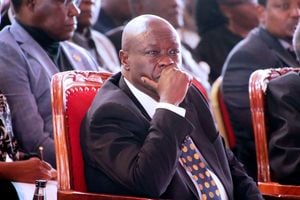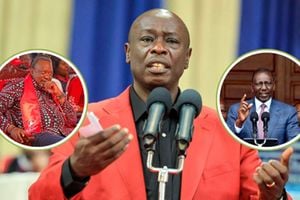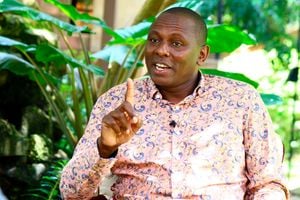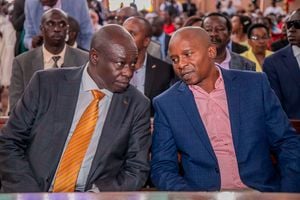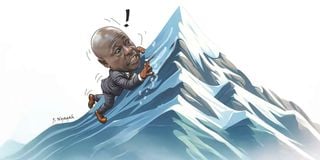
Heightened maneouvres in the Mt Kenya region seem designed to set the ground for an impeachment motion against Deputy President Rigathi Gachagua.
It is now almost certain that an impeachment motion against Deputy President Rigathi Gachagua is in the works. However, there is still a big question mark over whether President William Ruto is ready to risk a move that could badly impact his 2027 vote prospects in a populous region that was key to his electoral victory two years ago.
Heightened maneouvres over the past fortnight in the wider Mt Kenya seeking to cut-off the DP from his political base seem designed to set the ground for an impeachment push to be tabled in Parliament.
Contacted by The Weekly Review last Thursday, National Assembly Majority Leader Kimani Ichung’wah — a key player in the anti-Gachagua moves within the Mt Kenya region — denied knowledge of any such motion. He said he has not been involved in drafting one, nor has any landed on his desk from any other MP.
However, the conversation, following an interview the previous day on the Spice FM ‘The Situation Room’ morning talk show, seemed to be laying the grounds for impeachment. He had accused Gachagua of bullying and intimidating Mt Kenya leaders who did not dance to his tune, demanding that they ‘kneel’ before him.
The description was eerily reminiscent of the rationale provided when former President Daniel arap Moi orchestrated the 1989 Motion of Censure, which led to the resignation of short-lived Vice President Josephat Karanja, who had earned the tag of the ‘Kneel Before Me’ politicians.
Ichung’wah recounted how once at Sagana State Lodge, the DP had physically accosted and grabbed by the collar Dennis Itumbi, President Ruto’s social media propagandists and recently-appointed Head of Creative Economy and Special Projects in his office.
“Why would you be so petty and vindictive with leaders because they're not kneeling for you and not hailing you as the king and greatest of all,” Ichung’wah posed.
Itumbi, who has long run President Ruto’s social media propaganda machinery that has since the fallout at the top not been kind to Gachagua, would presumably be more than happy to give testimony on the DP’s over-bearing ways, as would many MPs who claim to have been bullied or threatened for not recognising his as the Mt Kenya political kingpin.
Incidentally, revelations of the State Lodge drama, which previously has only been whispered around as an unsubstantiated rumour, came two weeks after the ‘Hustler Nation Intelligence Bureau’, an online propaganda unit created by Itumbi during the 2022 election campaigns, disclosed another incident where Gachagua allegedly confronted Murang’a Governor Irungu Kang’ata.
A staffer in State House Communications team, Sam Terriz, who on X described himself as Director-General of the propaganda unit, posted on August 30 witnessing a ‘power exchange’ between the DP and the Governor shortly after the presidents tour of opposition leader Raila Odinga’s Nyanza bastion.
“Riggy G confronted Kang’ata yesterday at a holding room. He demanded to know why Kang’ata was in Nyanza without his express permission… Kang’ata then told him he could not ask for permission to accompany the President. Riggy G told him he was the leader of the mountain, and if Kang’ata needed to survive politically, he should inform him every time. Kang’ata walked out.”
When contacted, Kang’ata refused to comment on the incident, but The Weekly Review was able to independently confirm from unimpeachable sources that it happened as described.
Such an account even on social media should not be taken lightly. Although posted by an individual who says his views are personal, Terriz works at State House and is part of a large group of bloggers assembled by Itumbi to do Ruto’s dirty work on social media. Analysts have placed him at the centre of many campaigns on X, Facebook and other platforms where coordinated attacks have been launched on politicians, civil society actors, journalists and other individuals and groups who have incurred Ruto’s wrath.
And just a few days before Ichung’wah’s Spice FM appearance, former Public Service Minister Moses Kuria, who was recently appointed a Senior Advisor to the State House Council of Economic Advisors, had come out with his own post on X.
Below a photograph of Gachagua’s empty chair next to Ruto at a September 15 event attended by the President at an event in the DP’s Nyeri County backyard, Kuria wrote, “This is the last time this seat will be vacant, I swear”.
A harsh critic of the DP, Kuria told The Weekly Review that he believes the point of no return had been reached and Gachagua has to go. Although, like Ichung’wah, he said he was not privy to any impeachment papers being drafted, the outspoken politician believed that relations between the President and his deputy were damaged beyond repair.
He said any one of over 300 MPs could be working on the motion, adding that he sensed renewed determination to get rid of the DP now, rather than later, as “this toxicity cannot be allowed to last for another three years” to the end of the current term.
Kuria concedes that impeachment would be risky for Ruto because of the political fallout in the populous Mt Kenya region where Gachagua would garner a great deal of sympathy, but feels it’s better to act now when there will still be time to repair some of the damage, rather than wait till it was too late.
He agrees that the ground in Mt Kenya has shifted decisively to Gachagua’s side when he fell out with Ruto, but reasons for lost votes will be balanced by votes gained from elsewhere, possibly alluding to the political rapprochement with Raila, as well as efforts to secure the vote in western Kenya and Coast regions that previously went to the opposition chieftain. As impeachment is contemplated, a big question would be the specific charges that could sustain the move.
According to the Constitution, a Deputy President, just like the President, can be removed on grounds of physical or mental incapacity to perform the functions of office; or on impeachment, which would be based on grounds of a gross violation of the law or the Constitution; commission of crimes; or gross misconduct.
Physical or mental incapacity, which would have to be certified by a medical panel appointed by the Chief Justice, is not contemplated against Gachagua. What would be put into action is impeachment, which commences at the National Assembly and then goes to the Senate, a highly political process where the allegations levelled need not meet the evidence thresholds of a trial in court.
There will be no shortage of grounds with which to mount an impeachment motion as the standards prescribed by the Constitution are broad enough to encompass various infractions that can be hurled against Gachagua. What will matter is not so much the weight of evidence, but the weight of numbers in Parliament.
The tide there has decisively shifted against the DP after up to 48 MPs from the wider Mt Kenya region abandoned him with the recent Nyahururu Declaration recognising Interior Cabinet Secretary Kithure Kindiki as their political leader. There is also Ruto’s formation of the broad-based government, which incorporated Raila’s ODM nominees into the Cabinet, and presumably also his ODM MPs into a working alliance with Kenya Kwanza in Parliament.
Gachagua has already been walking on eggshells following clear attempts by the Director of Criminal Investigations Mohammed Amin and Director of National Intelligence Noordin Haji to link him to financing of the Gen Z uprising, which shook the Ruto government from June.
Ichung’wah’s radio interview and his subsequent conversation with The Weekly Review provided further grounds being examined, even though the Majority Leader denied any knowledge of an actual impeachment motion being prepared. Possible grounds include the aforementioned bullying, threats and intimidation of leaders who do not toe his line.
The Majority Leader, although not offering any proof, also alluded to misuse of funds, demanding an explanation of how the so-called ‘Confidential Expenditure’ available to the DP’s office was used, the controversial vote was halted as Ruto moved to calm the Gen Z protests by announcing cutbacks in government spending.
However, pinning Gachagua on misuse of the confidential budget might be tricky because Ruto also had access to an even bigger budget of that nature which similarly did not need to be accounted for.
Ichungw’ah demanded that Gachagua explain where in just two years in office he acquired billions to buy high-value hotel properties in Nairobi, Nyeri and the Coast, but again hedged when asked to provide proof if anything untoward in the financing. He also asked questions on the use of some Sh250 million allocated to the DP’s office for an anti-alcoholism campaign, and in particular purchase of a parcel of land in Laikipia for a planned rehabilitation centre.
Other issues related to the troubled tea and coffee sectors which Gachagua had been tasked with streamlining and ensuring fairer returns for farmers, but which have again been hit by the old problems around entrenched cartels. If allegations around corruption, misuse of office or commission of any crimes cannot stand, there are still powerful political charges to be thrown Gachagua’s way, including disrespecting the president, trying to establish an alternative centre of power, attempting to set himself up as an ethnic kingpin, and causing divisions in the government.
In that regard, Gachagua might have been his own worst enemy. He came to office suffering the illusion that he was the one who delivered the populous Mt Kenya vote to Ruto, and thus the president was beholden to him. However, that was a vote already largely in the bag by the time Ruto announced his choice for running-mate.
The President selected Gachagua over Kindiki who had actually won a vote of the Kenya Kwanza Mt Kenya caucus, but instead of working hard to win the Mt Kenya MPs to his side after the elections, he took it for granted that his place as undisputed regional supremo was guaranteed.
It was only much later on the realisation that his place was not very secure that he moved to try and mend fences with former President Uhuru Kenyatta, whom he had relentlessly fought on Ruto’s behalf. A Gachagua in control of the Mt Kenya vote would be a formidable player by any standards, but the jury is still out on whether he has managed to win the hearts and minds of the entire region. Kuria concedes that Gachagua has indeed gained plenty of traction in Mt Kenya, especially by capitalising on the victim card once it became clear he was facing pressure from the system.
Impeachment would be a dramatic open ‘trial’ which Gachagua would milk to reinforce his grip on Mt Kenya, but Kuria believes the damage can be cured. Even if he was removed and replaced as DP by Kindiki, Kiharu MP Ndindi Nyoro, Kirinyaga Governor Ann Waiguru or any other contenders from the region, Gachagua would still have the upper hand and be well-placed to negotiate fresh alliances with opposition figures such as Kalonzo Musyoka of Wiper Party and other Azimio coalition leaders. Kuria, however, does not see such a coalition triumphing over an alliance of Ruto (Rift Valley), Raila (Nyanza) and PCS Musalia Mudavadi (Western).
According to the controversial politician, the Mt Kenya people are a spoilt lot having held power consecutively for 20 years under President Kibaki (2003 to 2013) and Kenyatta (2013 to 2022) and prior to that 15 years under President Jomo Kenyatta from 1963 to 1978.
The community, he says, is suffering withdrawal symptoms from the loss of power just like Ruto’s Kalenjin community suffered on exit of President Daniel arap Moi in 2022. They are complaining about the present government, but when asked why they are disgruntled, and have no explanation.
They were used to Kibaki and Uhuru thinking for them, but now they are in the grip of a man (Gachagua) who has no idea where he’ll take them. Gachagua’s communications and political aide, former Nyeri Town MP Ngunjiri Wambugu disagrees. He sees the DP as clear and focused having captured the Mt Kenya ground, and therefore irremovable at this time.
While Ichung’wah and others are keen to prove their value to Ruto by pushing for impeachment, Kuria says, the President would not move unless he first assures that the DP is disconnected from his populous base. Hence the ongoing efforts to demonstrate that Gachagua is losing his grip, starting with the Nyahururu Declaration, a related initiative to split Mt Kenya East (Meru and Embu) from their Kikuyu cousins, and gathering of Meru Njuri Ncheke elders and MCAs from the wider region reject the DP.
According to Ngunjiri, however, Gachagua’s grip on the Mt Kenya vote is now so tight that when push comes to shove, Mt Kenya MPs know they would be committing political suicide if they voted for impeachment. “I don’t believe Ruto would allow impeachment, unless 100 percent sure that it would succeed without him suffering political wounds. His priority is to serve two terms, so he can’t afford to impeach Gachagua and then lose the elections.”
He draws parallels with the run-up to the 2022 elections when Ruto, as DP, was in open rebellion against President Kenyatta. There was talk of impeaching him, but the President could not dare mount such a push.
The difference, however, is that Ruto at the time had the numbers on his side in both Parliament and the governing Jubilee Party, while it had been demonstrated that Gachagua on that score stands on shaky ground. He is not however worried about the MPs as long as the DP commands his populous base, and is gaining more support with every attack he faces.

